SAMPLE VISUALLY ANNOTATED SPECIAL OCCASION SPEECH: “Love the Process”: A Soccer Star’s Philosophy of Life
SAMPLE VISUALLY ANNOTATED SPECIAL OCCASION SPEECH
“Love the Process”: A Soccer Star’s Philosophy of Life
YAEL AVERBUCH
U.S. Women’s National Soccer Team
In this special occasion speech, soccer player Yael Averbuch addresses a gathering of women’s soccer coaches at the National Soccer Coaches Association of America Soccer Breakfast in Philadelphia, Pennsylvania, on January 21, 2010. Averbuch’s speech, which is inspirational in nature, describes her realization that she values the long-term process of playing the sport more than winning a particular game or championship. Averbuch is a member of the U.S. Women’s National Soccer team, a player in the Women’s Professional Soccer (WPS) league, and a member of the 2009 WPS Championship team, Sky Blue FC. She was a two-time NCAA Championship team member at the University of North Carolina, and recipient of the 2008 NCAA VIII, a top honor recognizing eight college seniors nationwide for athletic/academic/community achievement.
 In a special occasion speech, it is important to acknowledge persons who are being honored.
In a special occasion speech, it is important to acknowledge persons who are being honored.
Good morning everyone. I’d like to start by thanking the women’s committee for inviting me here today and to congratulate Louise Waxler on the Award of Excellence. . . . 
When I was first asked to speak in front of this group, I have to be honest, I was slightly overwhelmed. Many of you in this room are the ones to whom I look for wisdom, and who have provided life-changing guidance to me over the years. 
 Averbuch offers respect to her audience of coaches.
Averbuch offers respect to her audience of coaches.
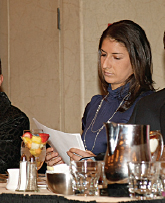
As I started to jot down some ideas, I realized that the person I am today is the result of so many different elements—elements I’ve picked up from some of the very people who I am standing in front of right now.  These elements form the essence of what has become my passion.
These elements form the essence of what has become my passion.
 Averbuch again acknowledges her debt to the coaches of her sport.
Averbuch again acknowledges her debt to the coaches of her sport.
Ever since I was a 9-year-old, attempting to get 10 thigh juggles on my front lawn, it has been my dream to be a professional soccer player. As a little girl, in my Mia Hamm jersey, I had no concept of exactly what that meant. There was no way I could have imagined what lay ahead, what it would take, or how I would get there.
But I knew what I wanted, and my goals have never wavered. Roughly a year ago, my childhood dream became reality when I signed my first professional contract with Sky Blue FC.
As a 23-year-old professional player, and current member of the Women’s National Team, I still see my journey as far from complete. Some people may look at my résumé and think I’ve “arrived,” but I see my career as just beginning. It’s a strange feeling to finally accomplish a goal for which you have sweat, bled, and cried for nearly 15 years to achieve. I would have expected to feel overjoyed—even just simply content.
 Averbuch segues into her thesis.
Averbuch segues into her thesis.
But while I am very proud of what I have achieved to this point, none of those emotions are fitting. As I embarked on my first professional season, at times I almost felt a sense of disappointment. I found myself thinking, “Is this really IT?” It was in uncovering the answer to this question that I came to truly realize why I do what I do. . . . 
Since the summer of 2000, when I was 12 years old and away from home at the UNC summer camp, I’ve kept a journal . . . filled with my thoughts, worries, goals, disappointments, and successes. . . . There is an entry from December of 1999 in which I recorded parts of a conversation I had with my first real mentor, and coach at the time, Ashley Hammond. Under his name, I have the following quote: “People in the world need and love experts. In soccer, you must be an expert in many skills.” I was 13 when I wrote that down.
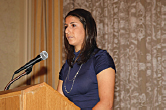
 Here Averbuch explicitly states her thesis, which is that she loves the process of being a soccer player most of all.
Here Averbuch explicitly states her thesis, which is that she loves the process of being a soccer player most of all.
Every month, I like to set myself 4 or 5 personal goals or ideas to keep in mind. I start off by choosing a quote or motto as a theme for the month, and then I pick a few simple goals to aim for. For example, . . . my December 2009 phrase captures what I have finally come to realize is most important in my quest for greatness in soccer. December’s motto was: “love the process.” 
This concept has come to mean something very important to me. . . . [N]ow that soccer is my profession, I have found that I need to put it in greater perspective within my life. The best way I have come to define my drive is this: I work TOWARDS a goal, but I do not work FOR it . . .
I believe that finding this joy, and loving the process itself, is essential. To truly be the best at what you do, the path will never be easy. The love of what we do is what provides the inspiration to see us through. My path to where I am today hasn’t always been smooth. . . .
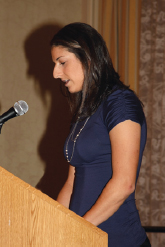
And every time that I think I’ve reached smooth sailing, I am soon humbled. I was very confident going into this past WPS season. I was a first-round draft pick, felt well prepared after my college career at UNC, and had done everything that I could to be ready for pre-season. . . . I was shocked when we got the starting lineup and I wasn’t in it. . . . I assumed I’d play the second half, considering that I thought I was going to start, but wasn’t in the lineup. . . . I was honestly shocked, and devastated. There will never be another inaugural season Sky Blue FC home opener, and I hadn’t even gotten the opportunity to step onto the field in front of my home crowd.
 Averbuch’s inclusive language (“our”) brings speaker and audience together in a common purpose.
Averbuch’s inclusive language (“our”) brings speaker and audience together in a common purpose.
It’s interesting to contemplate how our lives build to these special, pivotal moments—the moments we dream of, work towards, and emphasize so heavily.  But, in truth, the bulk of our life is in the in-between time, the waiting. The “off moments,” so to speak. The special moments are only minor reference points along the way. After an extremely angry and disappointed drive home from that Sky Blue FC opener, that is what I came to realize. I don’t play this sport for the moment of glory.
But, in truth, the bulk of our life is in the in-between time, the waiting. The “off moments,” so to speak. The special moments are only minor reference points along the way. After an extremely angry and disappointed drive home from that Sky Blue FC opener, that is what I came to realize. I don’t play this sport for the moment of glory.
And I think the people who DO are missing out. Yes, I love the roar of the crowd, the championship game, and the thrill of performing when it really matters—but I love the preparation—the process—equally as much . . .
 Averbuch offers an inspirational quotation to emphasize her theme.
Averbuch offers an inspirational quotation to emphasize her theme.
During the past WPS season, I read the book Way of the Peaceful Warrior, by Dan Millman. A major premise of the book is this line: “It’s not about dedicating your life to training, but about dedicating your training to your life.” 
This was an interesting new perspective for me. Yes, I dedicate an astounding number of my waking hours to soccer . . . But what does this all mean in the bigger picture? I find that for what I put INTO the game . . . I get back tenfold. . . .
 Averbuch’s frequent use of the personal pronouns “we” and “you” fosters inclusiveness.
Averbuch’s frequent use of the personal pronouns “we” and “you” fosters inclusiveness.
My training gives back to me in ways deeper than just success on the field. There is a sense of freedom, of peace, that I feel when I have a soccer ball at my feet. . . . We’ve all experienced it—the perfectly pure, uncompromised joy of being here, now. It is the moment of peace when all else fades away, and you are left fearless and energized.  It’s often described as “flow” or being “in the zone,” but whatever you call it, we are all familiar with that sensation—when you’re doing something enjoyable, and it just comes so easily.
It’s often described as “flow” or being “in the zone,” but whatever you call it, we are all familiar with that sensation—when you’re doing something enjoyable, and it just comes so easily.
This feeling for me doesn’t necessarily come in a moment of glory, in the last five minutes of a game, or in a winning play. It’s born from the passion of what I do when it “doesn’t matter,” when no one is watching, when nothing is at stake.
I find this feeling in the process, more often than I do in the result. I was reminded of this the night my college soccer career ended. We had just won the 2008 National Championship, and I sat in my room in Chapel Hill, actually feeling depressed, rather than satisfied. The team was out celebrating, and all I could seem to think about was the fact that it was finished. That was it. All those Tuesdays of doing fitness, all the excruciating pre-game meetings, the effort, nerves, preparation to win a national championship, and it was over. Just like that. I felt like I would have given back my national championship to spend just one more week with the team. The more I thought about it, the more it dawned on me. It was the PROCESS of winning that I loved, not so much the actual win.
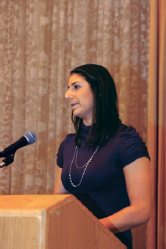
And when I think back on my life since I began playing soccer, the seemingly unimportant moments are the ones that come to mind first. It’s the videos I watched with my dad to learn about the game, and all our ridiculously naïve ideas on how things should be done.
. . . It’s the times playing on my own in the racquetball court, lost in the music of my iPod, when management would actually turn out the lights on me when my time was up.
 Beginning three successive sentences with the same or a similar phrase (“It’s the time . . . ”) lends rhythm to the speech.
Beginning three successive sentences with the same or a similar phrase (“It’s the time . . . ”) lends rhythm to the speech.
. . . It’s these moments that comprise the process, and that are most special to me. 
As I learned the night of the 2008 National Championship, if everything that you do, day in and day out, is solely building for a single moment—what becomes of it all when that moment has passed? It is this perspective that I have gained during the past year, and which I hope to carry with me throughout my life: Ideally, what we do in each moment should have value in and of itself. We should train just for the sake of training, play just for the sake of playing, and live just for the sake of living.
 The speaker reiterates her theme.
The speaker reiterates her theme.
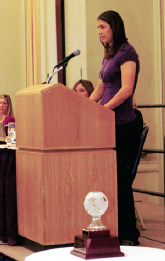
Winning is a process. Success is a process. Happiness is a process. And this point in my career is only one sliver of time within my process. . . . 
I have a tremendous amount of respect for everyone in this room, because you have the platform to shape players’ journeys. You might never know the little things you do that will change a person’s life. Maybe it’s as simple as a smile at the right time. . . . Even on the days when you feel like your athletes or co-workers couldn’t care less, and that no one is listening, there’s that one player in the group whose eyes light up when you speak, who is hanging on your every word, who will quote you in her journal. Coach for that player . . .
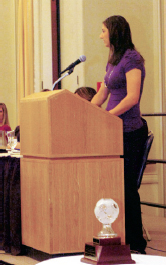
So, when I reflect back on the 15 years I’ve spent so far involved in this game, and the lifetime ahead I plan to, I hope to have an impressive list of accomplishments. I want to defend the WPS Championship, win a World Cup, and an Olympic gold medal. But when all is said and done, it is not only those accolades that I will cherish. . . .
I will always look forward to being home in New Jersey, where I can go kick the ball around at the local schoolyard with my sister.
I will always feel sentimental when I think about playing pickup on Fetzer Field (our UNC game field) in Chapel Hill at midnight, under the single light that’s left on.
 Averbuch once again uses the technique of anaphora—repeating the same phrase at the beginning of successive sentences—to make her conclusion memorable.
Averbuch once again uses the technique of anaphora—repeating the same phrase at the beginning of successive sentences—to make her conclusion memorable.
I will always laugh when I reminisce on the absurdity and turbulence of Sky Blue FC’s first season, when, it seems, we had more coaches than are currently sitting in this room. 